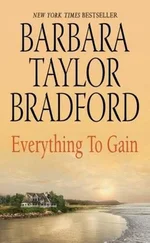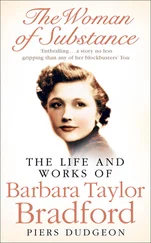On this Saturday morning, twenty months after the store had opened its doors, Emma Harte was in the black and profits were soaring. She had more than sufficient cash in hand to carry her for several years, she decided, as she reviewed the figures. Nonetheless, she was loath to pull fifty thousand pounds out of the store’s bank account at this moment, even though it was hefty with deposits. The country had only been at war for four days, but with her prescience Emma knew they could be in for a long siege, and she might suffer serious setbacks if trade fell off because of the public’s depressed mood, and their reluctance to buy in the grim days ahead. She recognized that she must not endanger the stability of the store by making rash moves or by over-extending herself.
Emma turned to the ledger for the Gregson Warehouse, a wholesale supply company she owned. Her eyes swept over the figures and she did some swift mental arithmetic. Her cash reserves for this company were considerably higher than the store’s bank balance, chiefly because she had owned it for a longer period, was selling products in bulk to the mass market, and had virtually no overheads. Moreover, she was heavily stocked and she would not need to buy new merchandise from the manufacturers for a year, and so she did not anticipate heavy cash expenditures.
She turned the page. Her glance settled on the Accounts Receivable columns. A quick tabulation of the figures reminded Emma that she was owed almost one-hundred-and-eighty-thousand pounds by the various stores in London, Manchester, and Scotland who bought from the wholesale warehouse on a regular basis. She was not worried. The money would start trickling in within the next thirty days. However, she had been aware for some weeks that a number of stores were tardy in their payments. She jotted down the names of those customers whose accounts were overdue and running into the ninety-day period, determining that pressure must be exerted on the delinquent companies immediately. Her terms were thirty to sixty days, although she often extended credit for longer periods to old and valued customers. Now that practice will have to cease, she concluded with detachment. Emma, who could be understanding of problems on a personal level, was hardheaded and without sentiment when it came to business. Joe had once accused her of having ice water in her veins and she had responded, ‘Yes, that’s true. Just like a banker.’
Emma sat back in her chair, tapping her teeth with the end of the pencil, lost in thought, and then she leaned forward and picked up the clipping from the Financial Times, which had been on her desk for the past week. The story in question detailed the closing of the London Stock Exchange and the raising of the bank rate from 4 per cent to 8 per cent on Friday, July 31. Both measures had been sensational, and to Emma they were indicative of the grave view of the crisis taken in financial circles. Emma had realized that the first action was simply intended to avoid panic in the City, by giving dealers time to steady themselves before being called upon to settle their disorganized Stock Exchange accounts. But she was aware that the raising of the bank rate was meant to hinder the drain of gold out of the country. To Emma, watchful and weighing all the odds, this had been the most ominous sign of all. Whatever the politicians said, war was imminent.
These developments had prompted her to take action regarding a business venture she had been contemplating. Rather than intimidating her into abandoning this new enterprise, it had actually encouraged her to plunge ahead with it. At the same time, the rise in the bank rate had induced her to reject the idea of borrowing from the bank to finance the project, as she had originally intended, and despite the fact that she had never been reluctant to use the bank’s money in the past.
In point of fact, when Emma began to extend her business in 1910, she had entered the arena of high finance with many powerful psychological advantages. By nature she was an optimist and totally unafraid of taking chances, believing she could make her own luck in business. Her risks were calculated risks and in a sense she was a guided gambler, as she was to be all of her life. David Kallinski understood her, being cast from the same mould himself.
Emma also had nerves of steel, and these characteristics set her apart from many of her male contemporaries and competitors who were unimaginative and fearful of losing what they had patiently accumulated. Emma was not at all inhibited by these fears, for she was dauntless, and responsive to all manner of business opportunities, which she seized with tenacious hands. Neither was she bothered by paper transactions or long-term borrowing. She had used all to her advantage in the past four years and would do so again if necessary.
But not at this moment, she said to herself, thinking of that 8 per cent bank rate. It was outrageous interest to pay. She had all that cash in the Gregson account and was owed a vast amount from the stores. She could easily take the fifty thousand pounds she needed without endangering the warehouse business. Removing the chequebook for the Gregson Warehouse from the drawer of her desk, she wrote out a cheque, put it in an envelope, addressed it to Frederick Ainsley, and returned the chequebook to the drawer. She looked at her watch, picked up the telephone, and dialled the warehouse.
Her manager, Vince Hartley, answered, as she had known he would. ‘Good morning, Vince. I’ve been going over the ledger and I notice that a number of our customers are behind in payment,’ she said.
‘Morning, Mrs Harte. Yes, I know. I was going to talk to you about them-’
‘I want you to start pulling that money in, Vince. First thing on Monday morning,’ Emma interrupted. ‘And don’t write the usual dunning letters. Telephone and follow up with telegrams. I want immediate results. If they can’t pay in full, insist on part payments. And you might point out to the stores whose accounts are outstanding for sixty days or longer that I intend to start charging interest. At once. Bank rates of 8 per cent.’
Vince Hartley sucked in his breath. ‘Mrs Harte, that’s a bit stiff, isn’t it? I don’t think they’ll like it. They might not buy from us again-’
‘I don’t give a damn whether they like it or not. And I certainly couldn’t care less if they don’t buy from us.’
‘But we’re bursting at the seams with stocks. We’ll have it on our hands if we’re not careful.’
‘No, we won’t,’ Emma said firmly. ‘There’s a war on now. Merchandise is going to be in short supply and hard to come by. I can use up those stocks in the store if necessary. In fact, I’ll probably need them. Many of the manufacturers we buy from will be turning their factories over to the production of government supplies. Uniforms and such, and so I’m not at all concerned about the stocks in the warehouse. In a sense, they’re a godsend.’
‘Yes, I see your point,’ Hartley conceded, wishing he had thought of that himself. But Emma Harte was always three jumps ahead of everyone else. Now he said, ‘There’s another problem I wanted to mention. Two of our commercial travellers, the ones covering Scotland, have given notice. They’re joining up today. That leaves us short-staffed. Shall I take on some new men to replace them?’
‘No, don’t bother. The two working Manchester and London will be sufficient. As I said, I may well need that merchandise for the store and I don’t want the warehouse to be completely depleted. Get on to those overdue accounts on Monday and let me know the results at the end of the day. I expect you to be tough about this, Vince. I don’t have time to deal with it myself, but I will if necessary.’
‘Please, Mrs Harte, don’t worry. You can rely on me,’ Hartley said nervously, knowing she meant every word.
Читать дальше
Конец ознакомительного отрывка
Купить книгу












